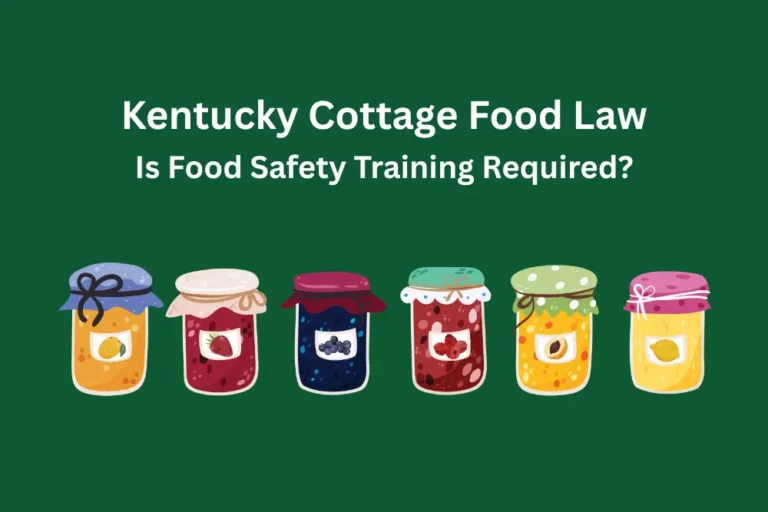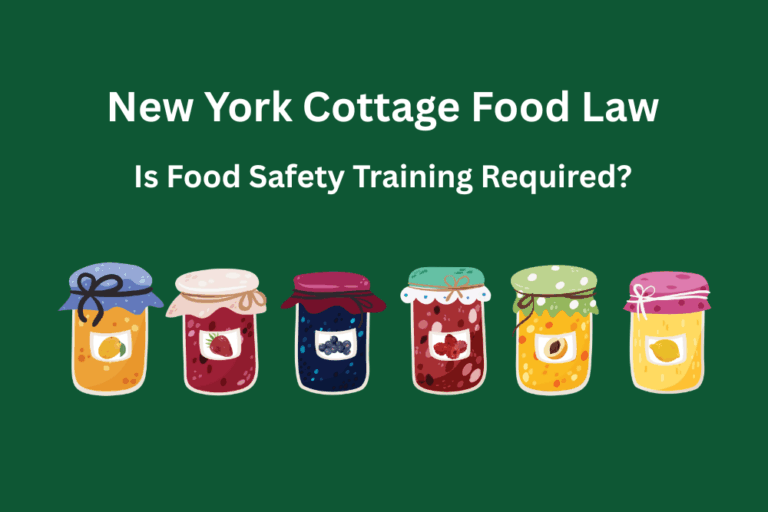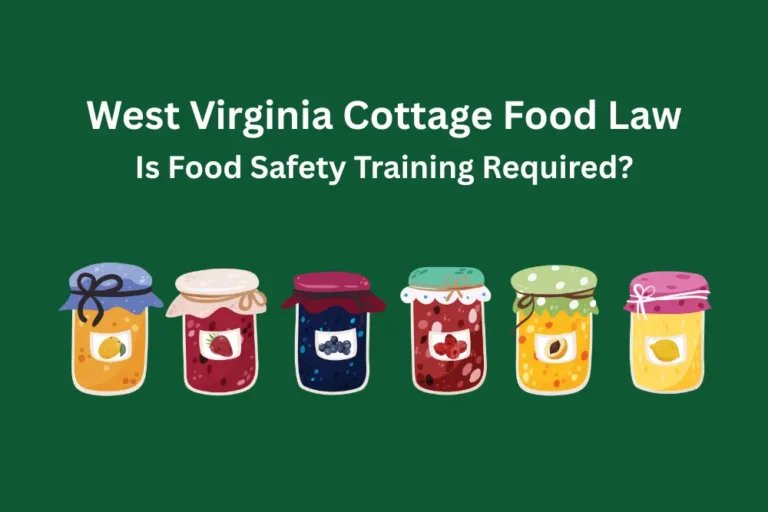Food Safety Training Requirements for Cottage Food Businesses
The number of homemade — or cottage food — businesses has increased significantly in recent years.
Fueling this demand is consumers’ growing interest in knowing where their food comes from and who produces it.
Each state has its own cottage food laws that regulate the types and quantities of food you can make and sell.
These laws also determine whether you need food safety training before operating a cottage food business.
This article outlines food safety training requirements for cottage food businesses to help you stay compliant with your state’s laws.
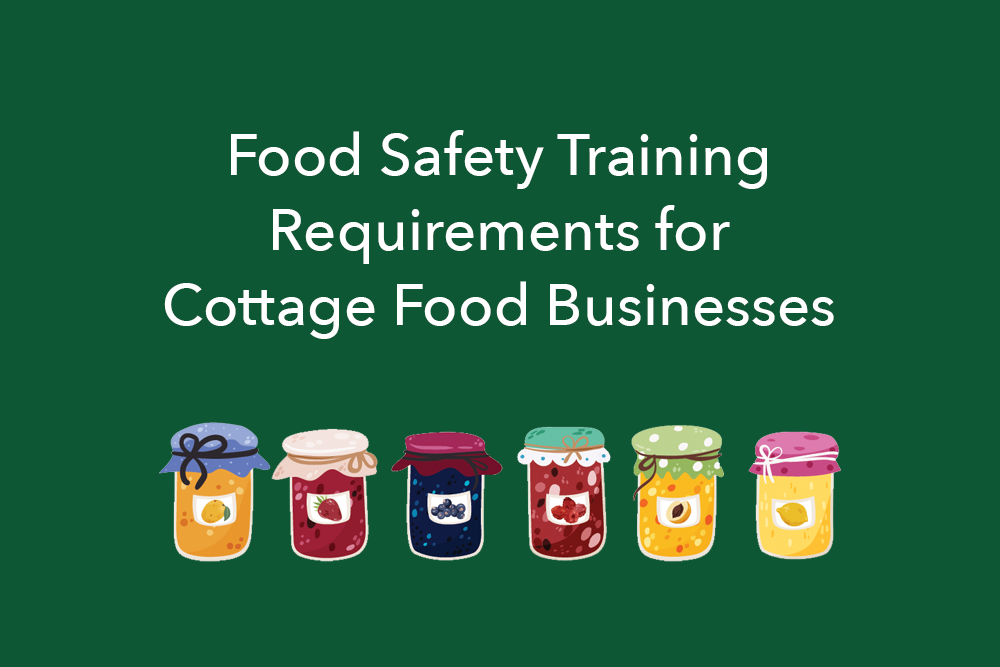
What is cottage food?
Cottage foods are those that generally don’t require time or temperature controls to keep them safe.
Common examples of cottage foods include:
- nuts, like almonds, walnuts, and cashews
- grains, like rice, corn, and oats
- seeds, like sunflower, sesame, and chia seeds
- dry mixes, like spices, baking or granola mixes, and coffee
- baked goods, like cookies, cakes, muffins, and breads
- confections, like hard candies and chocolate
These foods don’t provide bacteria with the environment or nutrients they need to survive and multiply.
As such, they are less likely to make people sick from a foodborne illness.
Conversely, most states generally prohibit the production and sale of foods with a favorable environment for bacterial growth, such as:
- cooked vegetables
- cooked hot dogs and pizza
- raw seed sprouts
- meats, poultry, and seafood
- dairy products
- cut melons, cut tomatoes, and leafy greens
These foods pose a greater risk of causing foodborne illnesses since they are common sources of pathogens or disease-causing organisms.
Most states require you to sell your homemade foods directly to consumers—in person at your residence, a farmers market, a roadside stand, or a temporary venue. They typically do not allow sales through third-party vendors like restaurants, grocery stores, or coffee shops.
Some states limit how much annual revenue you can make with your cottage food business, while others allow unlimited sales.
Summary
Homemade or cottage food generally refers to foods that don’t require time or temperature controls to keep them safe, such as nuts, grains, seeds, dry mixes, baked goods, and confections.
Food safety training requirements for cottage food business by state
Many states require that you take a food safety course before operating a cottage foods business.
Most of these states require ANSI-National Accreditation Board (ANAB)-accredited food handler training.
Here are the food safety training requirements for cottage foods by state:
| State | Food Safety Training Requirements for Cottage Foods |
|---|---|
| Alabama | Yes, an ANAB-accredited food handler training course or other state-approved food safety course. |
| Alaska | No, but training builds customer trust, expands selling opportunities, and may lower insurance costs. |
| Arizona | Yes; an ANAB-accredited food handler training course or other state-approved food safety course. |
| Arkansas | No, but training builds customer trust, expands selling opportunities, and may lower insurance costs. |
| California | Yes; an ANAB-accredited food handler training course. |
| Colorado | Yes; an ANAB-accredited food handler training course or other state-approved food safety course. |
| Connecticut | Yes; an ANAB-accredited food handler training course or other state-approved food safety course. |
| Delaware | Yes; an ANAB-accredited food handler training course or other state-approved food safety course. |
| Florida | No, but training builds customer trust, expands selling opportunities, and may lower insurance costs. |
| Georgia | Yes; an ANAB-accredited food handler training course or other state-approved food safety course. |
| Hawaii | Yes; an ANAB-accredited food handler training course or other state-approved food safety course. |
| Idaho | No, but training builds customer trust, expands selling opportunities, and may lower insurance costs. |
| Illinois | Yes; an ANAB-Conference for Food Protection food safety manager course. |
| Indiana | Yes; an ANAB-accredited food handler training course or other state-approved food safety course. |
| Iowa | Yes; an ANAB-accredited food handler training course or other state-approved food safety course. |
| Kansas | No, but training builds customer trust, expands selling opportunities, and may lower insurance costs. |
| Kentucky | No, but training builds customer trust, expands selling opportunities, and may lower insurance costs. |
| Louisiana | No, but training builds customer trust, expands selling opportunities, and may lower insurance costs. |
| Maine | No, but training builds customer trust, expands selling opportunities, and may lower insurance costs. |
| Maryland | Yes; an ANAB-accredited food handler training course or other state-approved food safety course. |
| Massachusetts | No, but some areas like Boston require food manager certification and food allergen training from an accredited course. |
| Michigan | No, but training builds customer trust, expands selling opportunities, and may lower insurance costs. |
| Minnesota | Yes; a state-approved course. |
| Mississippi | No, but training builds customer trust, expands selling opportunities, and may lower insurance costs. |
| Missouri | No, but training builds customer trust, expands selling opportunities, and may lower insurance costs. |
| Montana | No, but training builds customer trust, expands selling opportunities, and may lower insurance costs. |
| Nebraska | Yes, an ANAB-accredited food handler training course or other state-approved food safety course. |
| Nevada | Yes; but only for acidified foods. |
| New Hampshire | No, but training builds customer trust, expands selling opportunities, and may lower insurance costs. |
| New Jersey | Yes; an ANAB-Conference for Food Protection food safety manager course. |
| New Mexico | Yes; an ANAB-accredited food handler training course. |
| New York | No, but training builds customer trust, expands selling opportunities, and may lower insurance costs. |
| North Carolina | No, but training builds customer trust, expands selling opportunities, and may lower insurance costs. |
| North Dakota | No, but training builds customer trust, expands selling opportunities, and may lower insurance costs. |
| Ohio | No, but training builds customer trust, expands selling opportunities, and may lower insurance costs. |
| Oklahoma | Yes, an ANAB-accredited food handler training course or other state-approved food safety course if you’re selling time-temperature-control for safety products. |
| Oregon | No, but food safety training is required to sell time-temperature control for safety foods. |
| Pennsylvania | No, but training builds customer trust, expands selling opportunities, and may lower insurance costs. |
| Rhode Island | Yes, an ANAB-accredited food handler training course or other state-approved food safety course. |
| South Carolina | No, but training builds customer trust, expands selling opportunities, and may lower insurance costs. |
| South Dakota | No; but food safety training is required to sell canned goods. |
| Tennessee | No, but training builds customer trust, expands selling opportunities, and may lower insurance costs. |
| Texas | Yes; an ANAB-accredited food handler training course. |
| Utah | Yes, a state-approved food handler course. |
| Vermont | No, but training builds customer trust, expands selling opportunities, and may lower insurance costs. |
| Virginia | Yes; an ANAB-accredited food handler training course, unless you’re exempt. |
| Washington | Yes, a state-approved food handler course. |
| West Virginia | No, but training builds customer trust, expands selling opportunities, and may lower insurance costs. |
| Wisconsin | No, but training builds customer trust, expands selling opportunities, and may lower insurance costs. |
| Wyoming | No, but training builds customer trust, expands selling opportunities, and may lower insurance costs. |
Summary
This table outlines the food safety training requirements to operate a cottage food business for each state.
How to earn your food handler card as a cottage food operator
Most states that require food safety training for cottage food businesses require that the training be ANSI-National Accreditation Board (ANAB)-accredited.
Earn Your Food Handlers Card + Certificate to Sell Cottage Foods
Finish in 90 Minutes. Meets Your State’s Cottage Food Law.
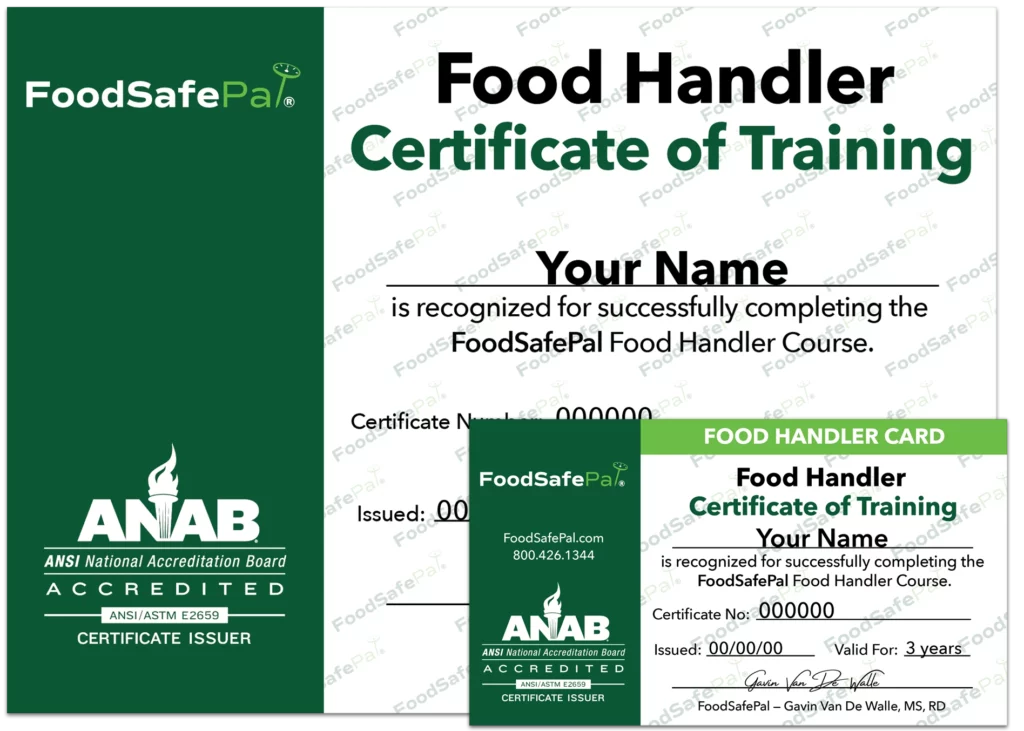
Food handler training covers content specific to licensed food establishments like restaurants, markets, and food trucks, as well as places that make and serve food like healthcare facilities and daycares.
As a result, some of the content may not apply to your cottage food business.
However, you still must know and understand the material to pass the test at the end of the course and earn your food handler card.
Food handler courses cover topics like:
- good personal hygiene
- handwashing
- time and temperature controls
- cross-contact and cross-contamination prevention
- cleaning and sanitizing procedures
You can train and test with FoodSafePal in as little as 90 minutes.
Once you pass the test and earn your food handlers card, you can print or download it.
This card and certificate serve as proof that you successfully completed the training, which you can submit as part of your application with the state to sell homemade food.
Summary
To earn your food handler card as part of your cottage food business application, enroll with a provider like FoodSafePal that offers an ANAB-accredited food handler course.
The bottom line
Homemade or cottage food refers to food you make at home and sold directly to consumers — either in person, at a farmers market, or another temporary venue.
Many states require you to complete an ANAB-accredited food handler training course before operating a cottage food business.
You’ll earn a food handler certificate after passing the test, which you’ll typically need as proof of training when applying with your state to operate a cottage food business.
Earn Your Food Handlers Card + Certificate to Sell Cottage Foods
Finish in 90 Minutes. Meets Your State’s Cottage Food Law.


